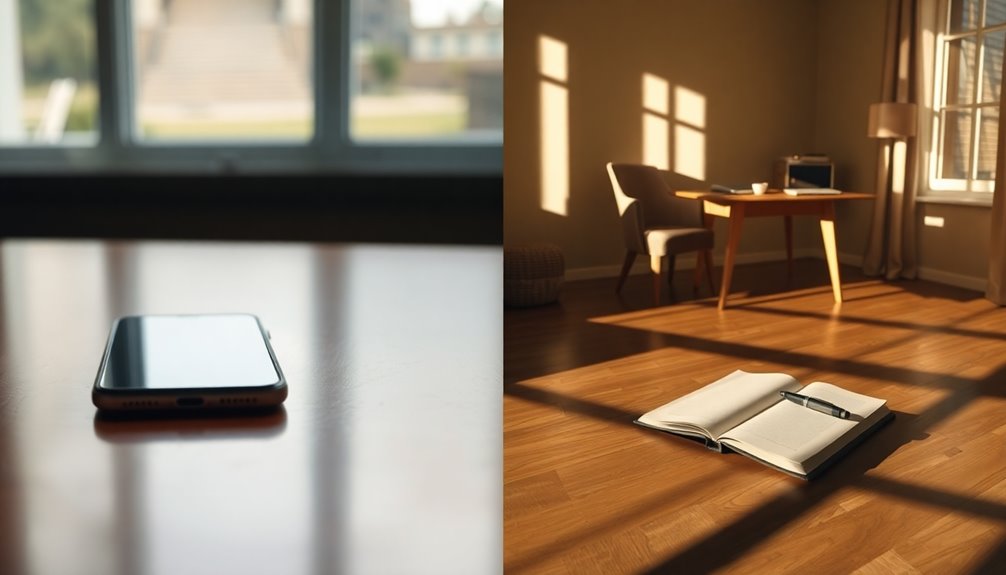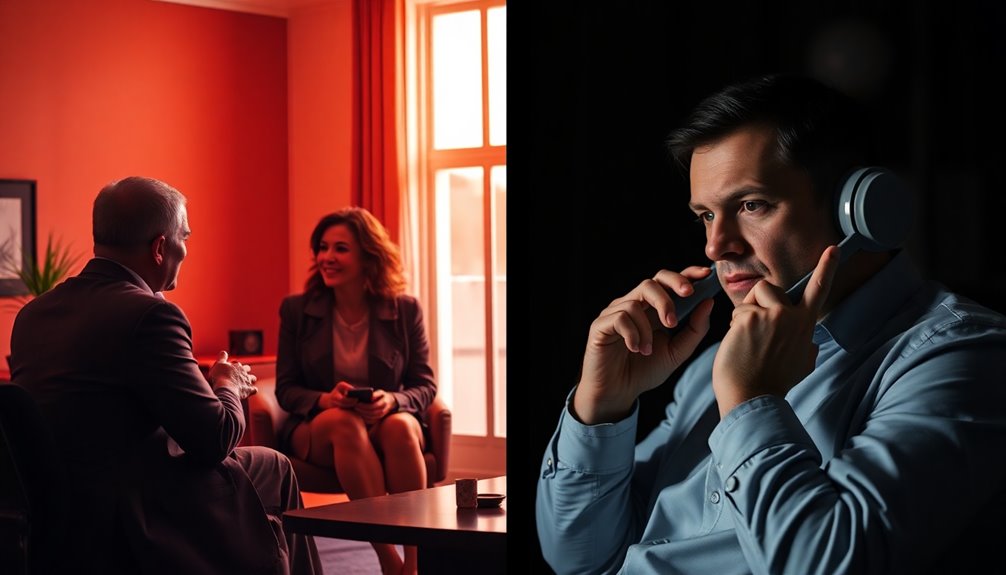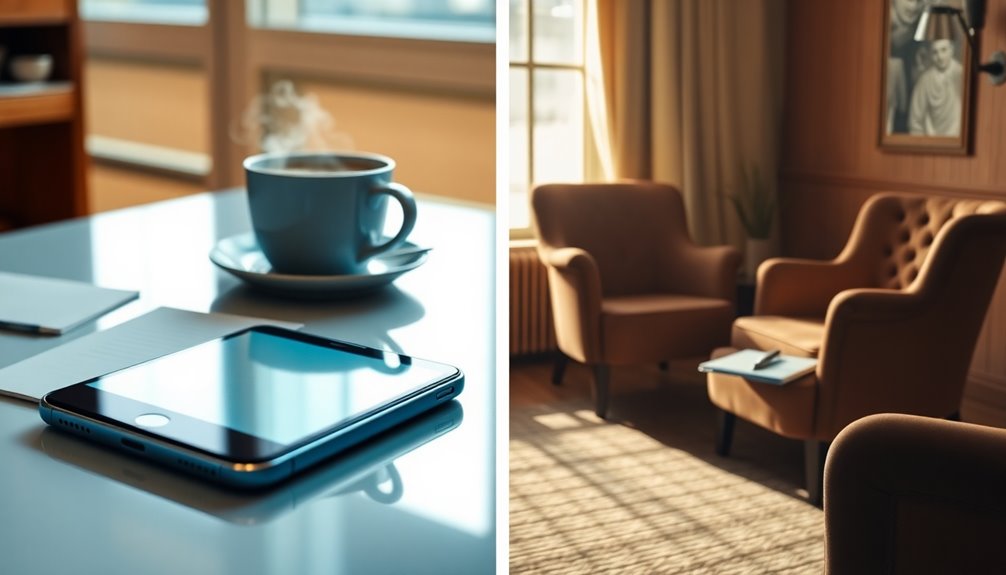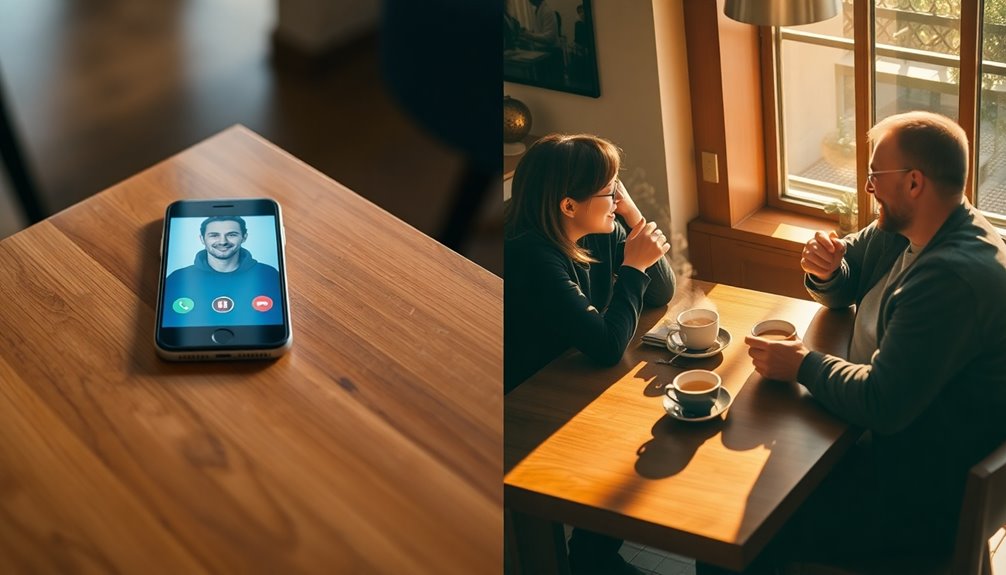When choosing between phone and in-person interviews, you'll find both have their pros and cons. Phone interviews expand your talent pool and are cost-effective, letting candidates use notes. However, they lack nonverbal cues that can evaluate soft skills. In-person interviews foster rapport and showcase your personality, but they come with pressure and geographic constraints. Both formats share common goals, focusing on determining candidate fit. Understanding these dynamics helps you make better hiring decisions. To discover more about optimizing your interview process, consider the various strategies that can enhance your approach.
Key Takeaways
- Phone interviews are cost-effective and time-efficient, expanding the talent pool without geographic limitations.
- In-person interviews allow for better rapport-building and assessment of nonverbal communication skills.
- Scheduling phone interviews can be challenging due to time zone differences, while in-person interviews may be limited by geographic constraints.
- Phone interviews enable candidates to use notes, enhancing their performance compared to the pressure of in-person settings.
- While phone interviews face technology issues, in-person interviews can lead to appearance bias and anxiety due to unfamiliar environments.
Similarities Between Interview Types

Often, both phone and in-person interviews share common goals and structures that help assess a candidate's fit for a position.
You'll find that preparation is key in both formats; practicing common questions and preparing inquiries about the role can boost your confidence. The purpose remains aligned, as interviewers aim to evaluate your suitability for the job.
Typically, interviews follow a consistent format, featuring a series of relevant questions designed to highlight your skills and experiences. Additionally, hiring managers or HR professionals usually conduct these interviews, ensuring a structured approach.
Phone interviews often act as initial screening tools, allowing employers to streamline the selection process before inviting candidates for in-person evaluations. This similarity sets the stage for your journey in the hiring process.
Benefits of Phone Interviews

Phone interviews offer several key benefits that can enhance the hiring process for both candidates and employers.
First, they eliminate location limitations, allowing you to connect with candidates from anywhere in the world. This broadens your talent pool considerably.
You can also assess candidates' phone communication skills, which are essential for many roles. Additionally, phone interviews let candidates use notes, helping them present their best selves without the pressure of in-person scrutiny.
They're also cost-effective and time-efficient, enabling quicker evaluation of applicants and determining who moves forward in the hiring process.
Drawbacks of Phone Interviews

Maneuvering the drawbacks of phone interviews can be challenging for both candidates and employers. You might find scheduling difficult, especially with time zone differences complicating availability.
Evaluating soft skills becomes tricky, as you can't gauge nonverbal cues or body language effectively. Additionally, building rapport often suffers; the brief format limits personal connection, making it harder to assess cultural fit.
Technology issues can disrupt the conversation, with connectivity problems or background noise distracting you and the interviewer. This disruption can hinder your focus and performance, impacting how well you present yourself.
Advantages of In-Person Interviews

In-person interviews offer unique advantages that enhance the overall hiring process. You get the chance to build rapport with the interviewer, allowing for a more personal connection that can positively impact their perception of you.
These interactions also give you the opportunity to showcase your personality and nonverbal communication skills, which are often lost in phone interviews. Additionally, you can engage with potential team members, gaining insights into the company culture and dynamics.
In-person settings allow for practical assessments, enabling hiring managers to evaluate your skills in real-time. Overall, the immersive nature of in-person interviews leads to a thorough assessment, helping both you and the employer determine if there's a good fit for the role.
Challenges of In-Person Interviews

Managing the challenges of in-person interviews can be intimidating for many candidates. You might feel the pressure of making a strong first impression while maneuvering through unfamiliar environments.
Here are some common hurdles you could face:
- Increased Pressure: The anxiety of performing well in front of multiple interviewers can overshadow your qualifications.
- Geographic Limitations: If you're not local, travel logistics can complicate scheduling, limiting your options.
- Appearance Bias: First impressions based on your appearance can lead to unintentional biases that affect your chances, regardless of your skills.
Being aware of these challenges can help you prepare and strategize for a successful in-person interview experience.
Understanding these issues allows you to focus on showcasing your true potential.
Exploring Alternative Interview Methods

In today's dynamic job market, exploring alternative interview methods can enhance your chances of success. Remote interviews, whether via phone or video, offer flexibility that traditional in-person meetings often lack. They save time, cut travel costs, and allow you to interview with potential employers from anywhere.
Additionally, diverse interview formats—like panel interviews or skills assessments—can provide an extensive view of your abilities. Each method has its unique benefits; remote options reduce pressure and scheduling conflicts, while in-person interviews facilitate personal connections. Moreover, understanding the emotional needs of candidates can lead to a more supportive interview environment.
Balancing Interview Approaches

Balancing various interview approaches can greatly enhance your hiring process. By integrating phone and in-person interviews, you can leverage their unique strengths while minimizing weaknesses.
Here are three strategies to achieve that balance:
- Initial Screening: Use phone interviews as a cost-effective way to narrow down candidates quickly, ensuring only the best reach the in-person stage.
- Depth Assessment: Follow up with in-person interviews for candidates who pass the initial screening, allowing for a deeper evaluation of their skills and cultural fit.
- Flexibility: Consider remote interviews for candidates who may face challenges attending in person, ensuring you don't miss out on top talent due to logistical issues.
Frequently Asked Questions
How Should Candidates Prepare Differently for Phone Versus In-Person Interviews?
To prepare for a phone interview, you can create a quiet environment and keep your notes handy, making it easier to reference them.
Practice speaking clearly and confidently, as body language won't be visible.
For an in-person interview, focus on your appearance and nonverbal cues like eye contact and posture.
Research the company culture to connect with the interviewers.
Both require preparation, but your approach should adapt to the format.
What Types of Roles Are Best Suited for Phone Interviews?
When considering which roles are best suited for phone interviews, think about positions that require strong communication skills, like sales or customer service.
These roles benefit from your ability to articulate ideas clearly over the phone. Additionally, technical positions where candidates can demonstrate their knowledge verbally without needing hands-on assessments are ideal.
Phone interviews also work well for remote roles, as they allow hiring managers to connect with candidates regardless of location.
How Can Candidates Effectively Follow up After an Interview?
After your interview, it's essential to follow up effectively.
Send a thank-you email within 24 hours, expressing your appreciation for the opportunity and reiterating your interest in the position. Mention a specific aspect of the conversation that resonated with you.
Keep it concise and professional.
If you haven't heard back after a week or two, consider sending a polite inquiry to check on your application status. This shows initiative and enthusiasm!
Are There Industries That Prefer One Interview Type Over the Other?
Absolutely, some industries do prefer one interview type over the other.
For instance, tech companies often lean towards phone or virtual interviews due to their convenience and ability to connect with global talent.
In contrast, sectors like healthcare or education might favor in-person interviews to gauge interpersonal skills and cultural fit more effectively.
Understanding these trends helps you tailor your approach based on the industry you're targeting, improving your chances of success.
How Do Cultural Differences Affect Interview Preferences and Styles?
Cultural differences shape interview preferences like a painter chooses colors for a masterpiece. You might find that some cultures value direct, concise communication, while others emphasize relationship-building and storytelling.
In more formal cultures, you may encounter structured interviews that follow strict protocols. Conversely, casual environments could foster a relaxed chat.
Recognizing these nuances helps you navigate interviews more effectively, allowing you to adapt your style and connect meaningfully with diverse interviewers.
Conclusion
In the grand theater of job hunting, both phone and in-person interviews have their leading roles. Each offers a unique script to follow, revealing different facets of your professional persona. While the phone might be a convenient whisper in your ear, the in-person encounter can be a vibrant dance, showcasing your true self. By understanding the strengths and weaknesses of each format, you can navigate this stage with confidence, ensuring you leave a lasting impression no matter the setting.









